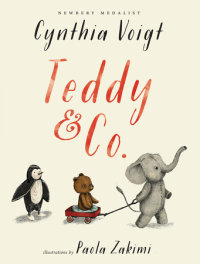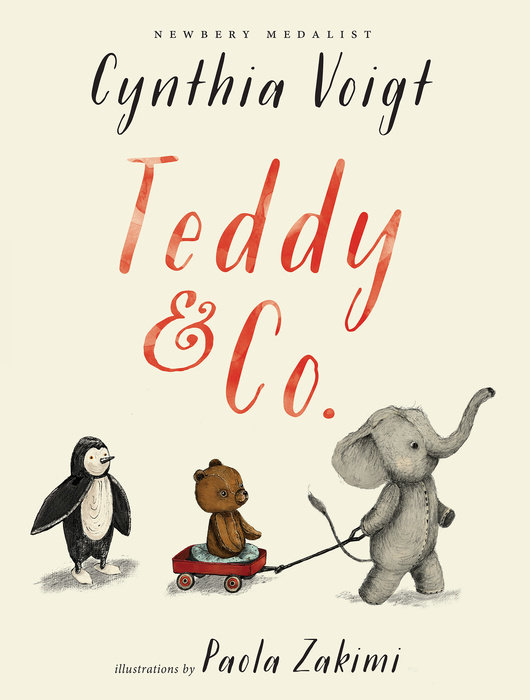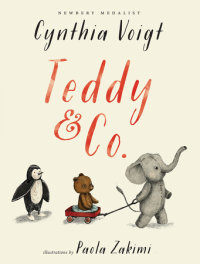Teddy & Co.
Fans of classic toy stories like Winnie-the-Pooh by A. A. Milne, The Miraculous Journey of Edward Tulane by Kate DiCamillo, and Toys Go Out by Emily Jenkins will love this illustrated novel by Newbery Medalist Cynthia Voigt.
Winner of a Parents Choice Silver Honor Award
Teddy is a thinking kind of bear. Of all his friends, he does the most wondering. He lives with a ragtag group of lost toys—a very hungry snake, an elephant who likes to bake, two charmingly silly pigs, and a reclusive penguin—and they all bump along happily together. But their peaceful world gets shaken up when new toys arrive—first a rabbit, who is not as soft and floppy as he looks, and then a beautiful doll with royal ambitions. Will the newcomers learn to fit into the community? Or will the community be forever changed by them? As Teddy the philosopher would answer: Yes.
Cynthia Voigt’s charming tale of community and compromise comes alive in the adorable pictures from Paola Zakimi. Fully illustrated and lovingly designed, this book would make a terrific gift or family read-aloud.
"An affirming celebration of friendship, kindness, and embracing new experiences and relationships." --Publishers Weekly
"This work has a classic sensibility, reminiscent of Winnie-the-Pooh. A great option for one-on-one bedtime read-alouds." --School Library Journal
An Excerpt fromTeddy & Co.
Night was over, it was morning, and Teddy’s red wagon was pulled up close to the window. Teddy was looking outside to see if the weather was good enough.
Good enough meant: Not raining.
Not good enough meant: Raining. Because if it was raining he had to stay inside, stay dry, and not go outside to see what might have happened in the darkness of night, when he was inside, sleeping.
That morning, the weather was good enough.
The night’s wind had blown itself out of the sky and dragged all the clouds after. Now a yellow sun floated just over the horizon. Teddy looked out his window at the big old beech tree and the low hill behind it, where four tall pines pointed up into the sky like spears, or candles on a birthday cake. Teddy looked out his window at the new day.
From his window, everything seemed the same today as yesterday, but what if it wasn’t?
“Umpah?” he called.
A soft gray elephant came into the room, accompanied by the sweet smells of good things baking in the oven. “Good morning, Teddy,” he said. “I’ve made peach muffins.”
Teddy wasn’t thinking about muffins. He was thinking about all the things that might happen in a night. “What if we slept outside?” he wondered.
“You wouldn’t want to do that,” said Umpah. “There would be no roof, no windows and doors to close against cold and rain. There would be no protection from the kind of wind that was blowing last night. Didn’t you hear it?”
“I don’t care about those things,” Teddy answered, even though he knew Umpah had the right of it.
“Houses are warmer and safer than outside. So are burrows, and caves.”
“That’s why they’re called shelter,” Teddy said. “That’s what shelter means. But still, things happen at night, outside, all night long.”
“Things also happen all day long,” Umpah argued. “Daytime things. We go out during the day and we stay inside at night.”
“But why?” asked Teddy.
“Because that’s the comfortable way,” Umpah explained. “Don’t bother yourself thinking about it.”
“It’s no bother,” Teddy said.
Umpah waited another pair of minutes, in case Teddy needed something else explained to him. But Teddy just stared out the window, so Umpah went back to his baking. He had no desire to sleep outside, even if there was bright moonlight and no wind. He didn’t want Teddy sleeping outside either, alone, all night long. Just for one thing, what if he was frightened and Umpah was sound asleep and didn’t hear him call? Or what if it suddenly started to rain, for another? How would Teddy get inside? He couldn’t make his wagon move by himself.
Umpah took a damp cloth to clean the flour from the countertop.
Teddy looked out the window and tried not to wonder what it might be like to sleep outside, among the mysterious shadows that moonlight casts when it falls through the wide, leafy branches of a beech tree, under a sky so filled with stars that there is almost no room for black empty spaces between them. Then he saw Sid’s pointed nose sticking out from his burrow under the beech tree roots.
Some nights, Teddy knew, Sid wrapped his long, striped body around one of the branches and slept outside. But Teddy couldn’t do that. He didn’t have Sid’s long, thin shape, good for wrapping around branches. He was a brown ball of a bear. He had a furry round brown head with bright button eyes, a short brown snout and little brown ears. He had no neck and stubby arms, a round brown belly, and he had lost his legs a long time ago. He knew he would fall right off any branch and plop down onto the ground.
Sid slipped out of his burrow and slid along the path to Teddy’s house. He saw Teddy, but he was heading for muffins and had no time to say Good Morning. He had no time to knock, either. He slid right in through the door and went to the kitchen. Teddy heard Umpah say “I’ve got peach muffins.”
He heard Sid say “I especially like peach muffins,” and then he thought he could hear the sound of muffins being swallowed whole, one after another, one muffin, two, three, four muffins, five.
“Good,” said Sid. “Thank you, Umpah. I feel better.”
“Did you feel bad?” asked Umpah. “Are you sick?”
“I was only empty and now I’m full. Can Teddy come out?”
“Yes of course,” Umpah said. He pulled Teddy’s wagon out into the front yard and returned to his baking.
When it was only Teddy and Sid and no Umpah, Sid moved the handle of the red wagon to where Teddy’s arms could reach it, then slithered around behind to put his head against the back and get it moving. Teddy steered by pushing against the handle. He pushed with his right arm to turn left and he pushed with his left arm to turn right and Sid pushed from behind and it all worked pretty well.
They went down the dirt path to the sandy beach, to see what the nighttime tide had carried in. That day, it was only a dead pine branch and some eelgrass. Sid looked, but there was nothing to eat hidden among the long black wet grasses, so he slithered back to Teddy and Umpah’s red house and had a two-muffin snack.
Alone on the beach, Teddy counted the waves as they rolled gently to shore, nibbling at the sand. The tide was going out and those waves gave him an idea to wonder about. He wondered if fewer waves came up to the shore when the tide was going out than when it was coming in. So as soon as Sid returned, he said, “When I say Go, turn around to face the beech tree and start counting to one hundred. I’ll count how many waves come in during that time. Then, when the tide is coming in this afternoon, I can count again while you count again too. Ready,” he said, “get set—”
“I don’t know how to count to one hundred,” Sid said. “Can I count to twenty? I know how to count to twenty.”
Teddy thought. “Can you count to twenty two times?” he asked. “Two times, one right after the other? And no rushing.”
“I can do that,” said Sid. “I think,” he said. “Will it take long? Because what if I get hungry?”
“Not very long,” Teddy promised. “Are you ready? Ready, get set, go!”
Teddy began to count very quietly, noticing every little wave that came creeping shyly up toward his wagon.
When Sid cried “Twenty! Twice!” Teddy stopped counting and memorized the number he’d reached, which was twenty-six.
After that they watched seagulls taking naps on top of the water.


